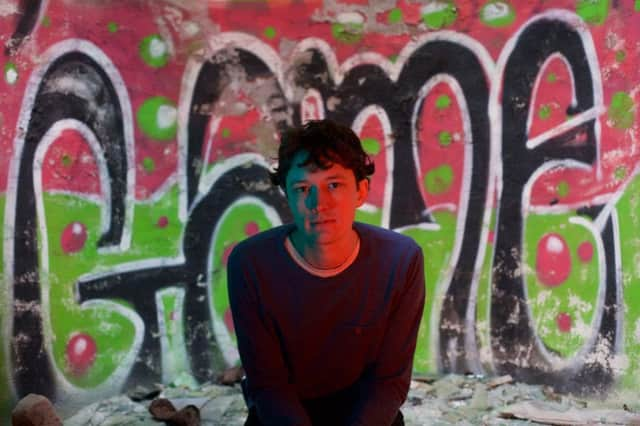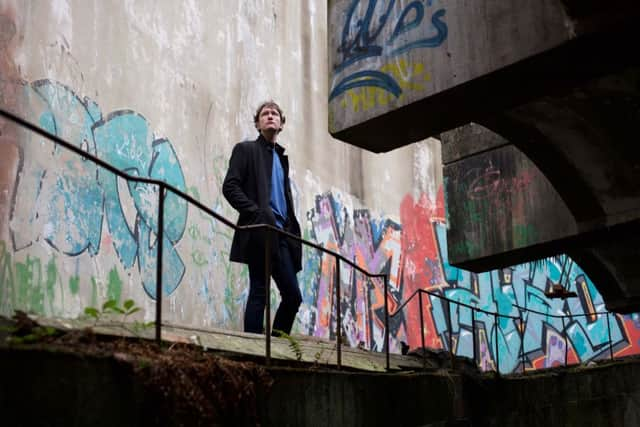Plenty of darkness under the surface of Miaoux Miaoux’s School of Velocity


Even so, it comes as a surprise when you play the first track on the label’s latest release and the intro – a series of crashing, stadium-sized synthpop chords – sounds like something from Genesis’s 1986 album Invisible Touch.
It’s surprising even to the musician who made it – Julian Corrie, aka Miaoux Miaoux. “I think they like it,” he says, “but sometimes I do wonder because it’s really bright, full-on pop music, particularly this one.”
Advertisement
Hide AdSchool of Velocity is Miaoux Miaoux’s second album for Chemikal Underground, and when it’s not sounding like Genesis it sounds like Scritti Politti, Prince, early Thomas Dolby, and Janet Jackson (the label’s press release reckons it also sounds like Caribou, a slightly more hipsterish reference point). Not that it’s wall to wall 1980s nostalgia. Like Daft Punk, Corrie combines retro influences with something more contemporary; before he was Miaoux Miaoux he was trying to establish himself as a serious DJ. “I started when I was at school and I was a total purist,” he recalls with a laugh. “I used to play this quite dark techno at school discos where everyone wanted to hear pop music.” Later, he says, “I was really into hip hop and breaks and scratching, DJ Shadow kind of stuff. And then there was a little sampler that I bought and I started making tracks with it.” Miaoux Miaoux began as a side project. “There was a record label expressing interest but nothing happened and I was really frustrated so this just seemed like a fun thing to do.”


If a particular period of pop music began floating around in his head, Corrie’s older sister can perhaps take some of the credit. “She played a lot of Fleetwood Mac,” he recalls. “And Nik Kershaw, is it? I’ve got such a strong memory of Wouldn’t It Be Good in particular. I really like all those synth sounds. I bought a Juno synth which is that sort of era, and it’s all over the record.” Scritti Politti are a much more recent discovery, after people kept pointing out the similarity. “I listened to them for the first time yesterday and holy s**t, it’s true. The arpeggios and the weird bits. He’s working within a 1980s pop framework but there’s something not quite right about it, a little bit strange. I like that.”
Pop seems to suit Corrie, a genial and boyish 29-year-old whose first album was called Rainbow Bubbles. He has an endearing analogy for his approach to making music. “You can tell sometimes when you meet someone that you’re going to get on with them, that you have a connection. I try to get my songs to that point. I don’t want to disparage any of my colleagues but I do feel like a lot of pop is like I’m meeting somebody who’s really boring and I’ve heard all their stories before. Being really creepy for a second, when I’m writing a song it’s like I’m building a person to be friends with. And when its finished I’m like, aw, hiya! That’s awful, but it’s the best way of describing it. I’m having a relationship with the music whilst I’m writing it which means that other people are kind of irrelevant.”
He is, he admits, obsessive – and somewhat solitary, at least while working. Corrie writes, performs and produces all of Miaoux Miaoux’s music himself in his own studio. While his last album, Light of the North, had guest vocalists, now he sings everything himself too. “It’s just convenient,” he reasons. “I can just do everything.” Luckily for his sanity, he has a part-time job that involves working with other people, sound engineering live radio broadcasts for the BBC in Glasgow. “You know when the news is on and they say ‘and we now go live to’? It’s basically that.” He also has a girlfriend, who is “very patient”.
But he clearly spends a substantial amount of time alone in the studio. There are, he says, four versions of every song on School of Velocity. “I basically wrote four records. I think my internal rhythm is quite chilled out so everything starts dozy and then speeds up. There’s a version of the whole record that really sucks, it’s really slow and badly mixed and badly sung. I tend to overegg the pudding too.” This may explain why it’s taken Corrie three years to follow up Light of the North – that and some “industry nonsense” which he’s reluctant to elaborate on but clearly prompted a crisis of confidence. “There was a period when I was really down about stuff and I thought about doing something else.”
The result of all this work, though, is one of 2015’s most exhilarating and uplifting pop albums – with, he says, some darkness underneath, “but no-one’s ever going to pick up on that unless I point it out”. The song Peaks Beyond Peaks, for example, seems to have sprung from that crisis of confidence. “It was this vision I had of people on top of the mountain going, ‘come on it’s great over here look at how much fun we’re having’ and so you slog it up there and when you get there you see there’s another one and there’s more people having more fun. And that’s you until you die. There’s no summit, there’s just a series of peaks beyond peaks. So that’s very depressing.” The album’s slowest track – called, fittingly, Unbeatable Slow Machine – is about “how living is basically pointless because everything is going to end eventually”. I would worry about him, except that Corrie tells me this while hooting with laughter.
Advertisement
Hide AdMake of this what you will, but Corrie is the son of an Anglican minister who only listens to classical music. “I grew up super religious and then I lost it at the age of 15. That’s been a point of contention for a few years. My whole family are quite religious. I’m sort of the black sheep. It will never go completely but I feel like I have enough of a rational distance from it. The difficulty is that it targets emotions so it’s an emotional battle that you probably won’t win. I did struggle with if for quite a long time.”
It might be, I suggest, that it’s now found a home in his music, If there’s one word that sums up Miaoux Miaoux, it’s euphoric. “I definitely think if anything can be described as spiritual that musical connection would be it,” he says, “I’ve listened to stuff that’s made me spontaneously cry because it’s so amazing.” The last music to make him cry was Bach, which should please his dad, a classical music fan. “The amount of emotion I attach to music sometimes makes me think it’s a terrible thing to be trying to make a career out of it,” Corrie continues, “because it’s too much of a precious thing putting that part of yourself out there. But then if you didn’t do that it would be terrible music, and you can tell when people haven’t done that because it sucks.”
School of Velocity is out now on Chemikal Underground